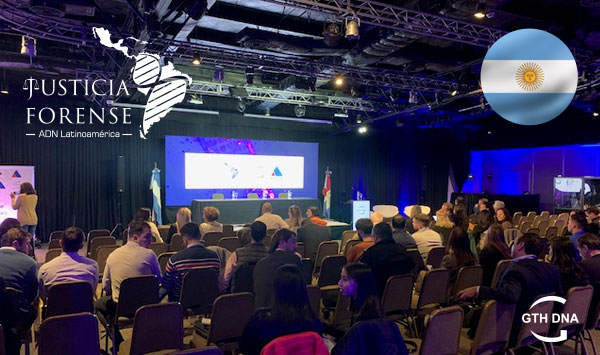Last Tuesday, April 18, 2023, in the city of Santa Fe, capital of the province of Santa Argentina, the International Symposium “DNA AS A RESEARCH TOOL IN CRIMINAL CASES” was held. The event was led by the GTH DNA Latam team and its “Justicia Forense” campaign for Latin America and coordinated by the Public Prosecutor’s Office of Santa Fe and the Faculty of Law of the National University of Litoral.
The event featured international speakers who provided elements of experience in the global context on the development of DNA databases as a guide for criminal policy in Argentina. Among the experts was Chris Asplen, executive director of the National Criminal Justice Association (NCJA) in the US. Asplen focused on the experiences of managing and working with an active DNA database from the perspective of a prosecutor and the court system. Kevin Mills, Director of GTH DNA Latin America, gave a presentation on the evolution of policies in the region and examples of relevant real cases solved using Forensic DNA.
Local expert Victor Moloeznick, head of the Investigation Department of the Public Prosecutor’s Office of Santa Fe, also participated. He gave a detailed presentation on the bill, its basic principles, the arguments for including certain crimes, and why sampling should be done at the point of arrest and accusation, not just at sentencing.
The presentations were completed by Tim Schellberg, President of GTH DNA. Tim discussed the global context of DNA, the short-, medium- and long-term gains known to come from such criminal policy and also the challenges in discussing the range of crimes and the length of time for which a State should retain data.
The presentations ended with the intervention of Congressman Juan Martín, who presented arguments from the legislative and political point of view in favor of a criminal DNA database necessary to improve criminal prosecution in Argentina.
Daniela Suarez from GTH DNA and María Consuelo Martí (Director of the AGO Forensic Laboratory) moderated a question and answer session that was presented to the panel on the implementation, regulation and supervision of a criminal DNA database.
The day before the symposium, Kevin Mills and Daniela Suarez from GTH DNA were invited to two live interviews (national radio and state TV), in which they presented a synopsis of the objectives of the symposium and a summary of the work developed by Justicia Forense in Latin America. To watch the interviews, please click on the links below.










 EL SALVADOR
EL SALVADOR HONDURAS
HONDURAS

 BOLIVIA
BOLIVIA PERÚ
PERÚ